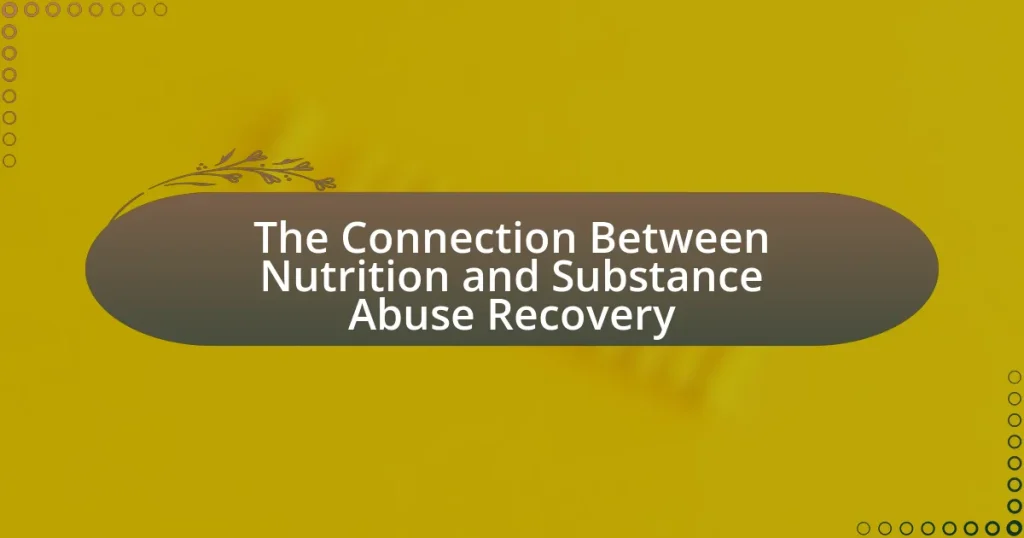The article examines the critical connection between nutrition and substance abuse recovery, emphasizing how a balanced diet supports physical health, mental well-being, and overall rehabilitation. It highlights the role of essential nutrients in restoring bodily functions, improving mood, and reducing cravings, which are vital for individuals in recovery. The discussion includes specific nutrients necessary for recovery, the impact of nutrition on withdrawal symptoms, and the importance of integrating nutritional strategies into treatment plans. Additionally, it addresses common misconceptions about nutrition in recovery and offers practical tips for maintaining a healthy diet to enhance recovery outcomes and prevent relapse.

What is the Connection Between Nutrition and Substance Abuse Recovery?
Nutrition plays a critical role in substance abuse recovery by supporting physical health, mental well-being, and overall rehabilitation. A balanced diet can help restore the body’s nutritional deficiencies caused by substance use, which is essential for healing and recovery. Research indicates that proper nutrition can improve mood, reduce cravings, and enhance cognitive function, all of which are vital for individuals in recovery. For instance, a study published in the journal “Nutrients” highlights that micronutrients such as vitamins and minerals are crucial for neurotransmitter function, which affects mood and behavior. Additionally, a well-nourished body is better equipped to cope with stress and withdrawal symptoms, facilitating a smoother recovery process.
How does nutrition impact the recovery process from substance abuse?
Nutrition significantly impacts the recovery process from substance abuse by providing essential nutrients that support brain function and overall health. A balanced diet can help restore neurotransmitter balance, which is often disrupted by substance use, thereby improving mood and reducing cravings. For instance, research published in the journal “Nutrients” highlights that deficiencies in vitamins and minerals can exacerbate withdrawal symptoms and hinder recovery. Additionally, proper nutrition can enhance physical health, which is crucial for individuals recovering from substance abuse, as it can reduce the risk of relapse and promote better mental health outcomes.
What specific nutrients are essential for individuals in recovery?
Essential nutrients for individuals in recovery include proteins, omega-3 fatty acids, vitamins (especially B vitamins), minerals (such as magnesium and zinc), and antioxidants. Proteins are crucial for repairing tissues and building neurotransmitters, which are often depleted during substance abuse. Omega-3 fatty acids support brain health and mood stabilization, while B vitamins play a vital role in energy metabolism and cognitive function. Minerals like magnesium and zinc are important for overall health and can help alleviate symptoms of withdrawal. Antioxidants combat oxidative stress, which can be heightened in individuals recovering from substance abuse. These nutrients collectively support physical and mental health, aiding in the recovery process.
How does a balanced diet support mental health during recovery?
A balanced diet supports mental health during recovery by providing essential nutrients that influence brain function and emotional well-being. Nutrients such as omega-3 fatty acids, vitamins, and minerals play critical roles in neurotransmitter synthesis and regulation, which are vital for mood stabilization. For instance, research published in the journal “Nutritional Neuroscience” indicates that diets rich in omega-3s can reduce symptoms of depression and anxiety, thereby enhancing recovery outcomes. Additionally, a balanced diet helps to stabilize blood sugar levels, which can prevent mood swings and irritability, further supporting mental health during the recovery process.
Why is nutrition often overlooked in substance abuse treatment?
Nutrition is often overlooked in substance abuse treatment due to a primary focus on detoxification and psychological interventions. Treatment programs typically prioritize immediate withdrawal management and mental health support, neglecting the role of nutrition in recovery. Research indicates that substance abuse can lead to nutritional deficiencies, which can exacerbate mental health issues and hinder recovery. For instance, a study published in the Journal of Substance Abuse Treatment highlights that inadequate nutrition can impair cognitive function and emotional stability, both critical for successful recovery. Thus, the lack of emphasis on nutrition in treatment programs can undermine overall recovery outcomes.
What are the common misconceptions about nutrition in recovery?
Common misconceptions about nutrition in recovery include the belief that all calories are equal, that restrictive diets are necessary for detoxification, and that supplements can replace whole foods. Many individuals assume that as long as they consume enough calories, their nutritional needs are met, ignoring the importance of nutrient density and balance. Additionally, some believe that cutting out entire food groups will aid in recovery, despite evidence showing that a varied diet supports overall health and healing. Lastly, the reliance on supplements can lead to neglecting the benefits of whole foods, which provide essential vitamins, minerals, and fiber crucial for recovery. These misconceptions can hinder the recovery process by promoting unhealthy eating habits and inadequate nutrition.
How can healthcare providers better integrate nutrition into recovery programs?
Healthcare providers can better integrate nutrition into recovery programs by implementing personalized nutrition assessments and tailored meal plans for individuals in recovery. Research indicates that proper nutrition can significantly enhance physical and mental health, which is crucial for successful recovery from substance abuse. For instance, a study published in the Journal of Substance Abuse Treatment found that individuals who received nutritional counseling alongside traditional therapy showed improved outcomes in their recovery process. By prioritizing nutrition, healthcare providers can address deficiencies that may contribute to cravings and relapse, ultimately supporting a holistic approach to recovery.

What role does nutrition play in physical health during recovery?
Nutrition plays a critical role in physical health during recovery by providing essential nutrients that support healing and restore bodily functions. Adequate nutrition enhances immune function, promotes tissue repair, and helps maintain energy levels, which are vital for individuals recovering from substance abuse. Research indicates that specific nutrients, such as proteins, vitamins, and minerals, are crucial for neurotransmitter synthesis and overall brain health, which can be adversely affected by substance use. For instance, a study published in the Journal of Nutrition found that individuals recovering from alcohol dependence showed significant improvements in mood and cognitive function when their diets were supplemented with essential fatty acids and B vitamins. This evidence underscores the importance of a balanced diet in facilitating recovery and improving physical health outcomes.
How does nutrition affect physical symptoms of withdrawal?
Nutrition significantly influences the physical symptoms of withdrawal by providing essential nutrients that support the body’s recovery processes. A balanced diet rich in vitamins, minerals, and proteins can alleviate symptoms such as fatigue, nausea, and muscle aches, which are common during withdrawal. For instance, deficiencies in B vitamins and magnesium have been linked to increased withdrawal symptoms, as these nutrients play critical roles in energy metabolism and nerve function. Research indicates that adequate nutrition can enhance the body’s ability to detoxify and restore homeostasis, thereby reducing the severity and duration of withdrawal symptoms.
What dietary changes can alleviate withdrawal symptoms?
Incorporating a diet rich in whole foods, including fruits, vegetables, lean proteins, and whole grains, can alleviate withdrawal symptoms. These foods provide essential nutrients that support brain health and stabilize mood, which is crucial during withdrawal. For instance, omega-3 fatty acids found in fish and flaxseeds have been shown to reduce anxiety and improve cognitive function, aiding in recovery. Additionally, maintaining hydration and reducing sugar intake can help manage cravings and mood swings, as dehydration and blood sugar fluctuations can exacerbate withdrawal symptoms. Studies indicate that a balanced diet can significantly improve overall well-being and support the recovery process, making dietary changes a vital component of managing withdrawal.
How does hydration influence recovery from substance abuse?
Hydration significantly influences recovery from substance abuse by supporting physical health and cognitive function. Adequate water intake helps to alleviate withdrawal symptoms, such as headaches and fatigue, which can hinder the recovery process. Research indicates that dehydration can exacerbate mood disorders and cognitive impairments, both of which are critical during recovery. For instance, a study published in the Journal of Substance Abuse Treatment found that individuals who maintained proper hydration levels reported lower levels of anxiety and improved mood, facilitating a more effective recovery journey. Thus, staying hydrated is essential for enhancing overall well-being and supporting the recovery process from substance abuse.
What are the long-term health benefits of proper nutrition in recovery?
Proper nutrition in recovery provides long-term health benefits such as improved physical health, enhanced mental well-being, and reduced risk of relapse. A balanced diet rich in essential nutrients supports the body’s healing processes, strengthens the immune system, and promotes overall vitality. Research indicates that individuals who maintain proper nutrition during recovery experience better mood regulation and cognitive function, which are crucial for sustaining sobriety. For instance, a study published in the Journal of Substance Abuse Treatment found that nutritional interventions significantly improved recovery outcomes among individuals with substance use disorders. This evidence underscores the critical role of nutrition in fostering resilience and long-term recovery success.
How can nutrition help prevent relapse in recovering individuals?
Nutrition can help prevent relapse in recovering individuals by stabilizing mood, reducing cravings, and improving overall physical health. A balanced diet rich in essential nutrients supports brain function and emotional regulation, which are critical during recovery. For instance, studies show that deficiencies in vitamins and minerals can lead to increased anxiety and depression, both of which are risk factors for relapse. Additionally, specific nutrients like omega-3 fatty acids have been linked to reduced cravings and improved mental health outcomes. Therefore, proper nutrition not only aids in physical recovery but also plays a vital role in maintaining psychological stability, ultimately decreasing the likelihood of relapse.
What role does nutrition play in rebuilding physical strength and stamina?
Nutrition plays a critical role in rebuilding physical strength and stamina by providing the essential nutrients needed for muscle repair, energy production, and overall recovery. Adequate protein intake is vital for muscle synthesis, while carbohydrates replenish glycogen stores, which are crucial for sustained energy during physical activities. Additionally, vitamins and minerals support metabolic processes and immune function, further enhancing recovery. Research indicates that a balanced diet rich in these nutrients can significantly improve physical performance and recovery times, as evidenced by studies showing that athletes who consume adequate nutrition recover faster and perform better than those who do not.

How can individuals implement nutritional strategies in their recovery journey?
Individuals can implement nutritional strategies in their recovery journey by focusing on a balanced diet rich in whole foods, which supports physical and mental health. Consuming nutrient-dense foods such as fruits, vegetables, whole grains, lean proteins, and healthy fats can enhance mood and energy levels, aiding in the recovery process. Research indicates that proper nutrition can reduce cravings and withdrawal symptoms, as evidenced by a study published in the Journal of Substance Abuse Treatment, which found that individuals who maintained a healthy diet reported lower relapse rates. Additionally, hydration and regular meal timing can stabilize blood sugar levels, further supporting emotional stability during recovery.
What are practical tips for maintaining a healthy diet during recovery?
To maintain a healthy diet during recovery, individuals should focus on consuming a balanced diet rich in whole foods, including fruits, vegetables, lean proteins, and whole grains. This approach supports physical health and can help stabilize mood and energy levels, which are crucial during recovery. Research indicates that a diet high in nutrients can reduce cravings and improve overall well-being, as seen in studies linking nutrition to mental health outcomes. For example, a study published in the journal “Nutrients” found that specific nutrients, such as omega-3 fatty acids and B vitamins, play a significant role in brain health and recovery from substance abuse. Additionally, staying hydrated and avoiding processed foods can further enhance recovery efforts by minimizing inflammation and promoting better physical health.
How can meal planning support recovery efforts?
Meal planning can support recovery efforts by ensuring individuals have access to balanced, nutritious meals that promote physical and mental well-being. Proper nutrition is critical during recovery, as it helps restore the body’s health, stabilize mood, and reduce cravings. Research indicates that a well-structured diet can enhance brain function and improve emotional regulation, which are essential for individuals overcoming substance abuse. For example, a study published in the Journal of Substance Abuse Treatment found that individuals who maintained a healthy diet experienced lower relapse rates compared to those with poor nutritional habits. Thus, meal planning serves as a practical tool in fostering a supportive environment for recovery by prioritizing health and stability.
What resources are available for nutritional guidance in recovery?
Nutritional guidance resources in recovery include registered dietitians specializing in addiction, online support groups, and educational materials from organizations like the Substance Abuse and Mental Health Services Administration (SAMHSA). Registered dietitians can provide personalized meal plans and nutritional advice tailored to individual recovery needs, while online support groups offer community and shared experiences related to nutrition in recovery. SAMHSA provides resources and publications that emphasize the importance of nutrition in the recovery process, highlighting studies that show improved recovery outcomes with proper nutritional support.
What common challenges do individuals face in maintaining nutrition during recovery?
Individuals face several common challenges in maintaining nutrition during recovery from substance abuse. These challenges include cravings for unhealthy foods, emotional eating, and financial constraints that limit access to nutritious options. Research indicates that cravings can lead to poor dietary choices, as individuals may seek comfort in high-sugar or high-fat foods, which can exacerbate recovery difficulties. Additionally, emotional instability during recovery often results in individuals turning to food for solace, further complicating their nutritional needs. Financial limitations can restrict access to fresh produce and healthy proteins, making it harder for individuals to maintain a balanced diet. These factors collectively hinder the ability to achieve optimal nutrition, which is crucial for successful recovery.
How can individuals overcome emotional eating triggers in recovery?
Individuals can overcome emotional eating triggers in recovery by developing awareness of their emotional states and implementing coping strategies. Recognizing the emotions that lead to eating can help individuals differentiate between physical hunger and emotional cravings. Techniques such as mindfulness meditation, journaling, and engaging in physical activities can serve as effective alternatives to manage stress and emotional discomfort. Research indicates that mindfulness practices can reduce emotional eating by enhancing self-regulation and awareness (Keng, Smoski, & Robins, 2011, Journal of Clinical Psychology). By actively addressing emotional triggers and employing healthier coping mechanisms, individuals can significantly reduce the likelihood of turning to food for comfort during recovery.
What strategies can help individuals stay motivated to eat healthily?
To stay motivated to eat healthily, individuals can set specific, achievable goals and track their progress. Research indicates that goal-setting enhances motivation by providing clear targets, which can lead to a sense of accomplishment when those goals are met. Additionally, creating a meal plan and preparing healthy meals in advance can help individuals make better food choices, as it reduces the likelihood of impulsive eating. A study published in the Journal of Nutrition Education and Behavior found that meal planning is associated with healthier eating patterns. Furthermore, seeking social support from friends, family, or support groups can reinforce healthy eating habits, as shared experiences and encouragement can boost motivation.
What are the best practices for integrating nutrition into a recovery plan?
The best practices for integrating nutrition into a recovery plan include focusing on balanced meals, ensuring adequate hydration, and incorporating nutrient-dense foods. Balanced meals that include a variety of macronutrients—proteins, carbohydrates, and healthy fats—support overall health and recovery. Adequate hydration is crucial, as it aids in detoxification and cognitive function. Nutrient-dense foods, such as fruits, vegetables, whole grains, lean proteins, and healthy fats, provide essential vitamins and minerals that can help repair the body and improve mood, which is particularly important during recovery from substance abuse. Research indicates that proper nutrition can enhance recovery outcomes by reducing cravings and improving mental health, as evidenced by studies showing that individuals with better nutritional status have lower relapse rates.
